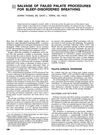 434 citations,
October 2003 in “PTR. Phytotherapy research/Phytotherapy research”
434 citations,
October 2003 in “PTR. Phytotherapy research/Phytotherapy research” Natural products in cosmetics are beneficial for skin and hair care with low toxicity.
 October 2003 in “Journal of Investigative Dermatology Symposium Proceedings”
October 2003 in “Journal of Investigative Dermatology Symposium Proceedings” Mice treatments didn't grow hair, a patient treatment may affect immune response, and people with hair loss often feel anxious or depressed.
 1 citations,
September 2003 in “Journal of the Royal Society of Medicine”
1 citations,
September 2003 in “Journal of the Royal Society of Medicine” The book is a detailed guide on hair and scalp diseases, useful for dermatopathologists.
 42 citations,
January 2011 in “Journal of Biomedical Optics”
42 citations,
January 2011 in “Journal of Biomedical Optics” Infrared and Raman imaging can non-destructively analyze hair structure and help diagnose hair conditions.
 December 2002 in “Operative Techniques in Otolaryngology-Head and Neck Surgery”
December 2002 in “Operative Techniques in Otolaryngology-Head and Neck Surgery” Hair loss from trauma can be managed using scalp expansion, flaps, and hair transplants to improve appearance and well-being.
 22 citations,
June 2012 in “PLOS ONE”
22 citations,
June 2012 in “PLOS ONE” Cholesterol-related compounds can stop hair growth and cause inflammation in a type of scarring hair loss.
 28 citations,
December 2017 in “Lasers in Medical Science”
28 citations,
December 2017 in “Lasers in Medical Science” Monochromatic light devices, especially the 308-nm excimer laser, are promising for treating alopecia areata but more research is needed.
 6 citations,
July 2018 in “Advances in Clinical and Experimental Medicine”
6 citations,
July 2018 in “Advances in Clinical and Experimental Medicine” Different body parts have varying levels of certain hair follicle markers.
 19 citations,
January 2018 in “Scientific Reports”
19 citations,
January 2018 in “Scientific Reports” Non-immune factors play a significant role in alopecia areata.
 14 citations,
September 2010 in “Annals of Plastic Surgery”
14 citations,
September 2010 in “Annals of Plastic Surgery” Hair restoration has evolved from surgery to drugs to potential gene therapy, with improved results and ongoing research driven by high demand.
 8 citations,
January 1996 in “Springer eBooks”
8 citations,
January 1996 in “Springer eBooks” Male pattern baldness may be caused by factors like poor blood circulation, scalp tension, stress, and hormonal imbalances, but the exact causes are still unclear.
2 citations,
January 2023 in “Frontiers in Oncology” Mild oxidative stress can prevent hair loss from chemotherapy.
 April 2017 in “Australasian Journal of Dermatology”
April 2017 in “Australasian Journal of Dermatology” Most patients with Lichen planopilaris improved with acitretin, but treatments often didn't work well; preventing infection in skin surgery is important, and bupivacaine might be a better anesthetic.
 7 citations,
March 2017 in “Annals of Plastic Surgery”
7 citations,
March 2017 in “Annals of Plastic Surgery” The new Mercedes flap variant effectively closed medium-sized scalp defects in a single operation with good cosmetic results and no complications.
9 citations,
June 2019 in “Plastic & Reconstructive Surgery Global Open” The procedure safely and effectively lifted the lateral brow, improving appearance with minimal complications.
 20 citations,
August 2014 in “PloS one”
20 citations,
August 2014 in “PloS one” MED1 affects skin wound healing differently in young and old mice.
 9 citations,
July 1992 in “Clinics in Dermatology”
9 citations,
July 1992 in “Clinics in Dermatology” Scalp reduction surgery can effectively treat male pattern baldness when tailored to the patient and performed with care to minimize complications.
 November 2021 in “Austin therapeutics”
November 2021 in “Austin therapeutics” Current treatments for hair loss from chemotherapy are limited, but new methods are being researched.
 26 citations,
May 2014 in “BioEssays”
26 citations,
May 2014 in “BioEssays” Using neurohormones to control keratin can lead to new skin disease treatments.
 May 2010 in “Journal of the Dermatology Nurses' Association”
May 2010 in “Journal of the Dermatology Nurses' Association” Cicatricial alopecia causes permanent hair loss and is treated to relieve symptoms and stop progression.
 41 citations,
June 2006 in “Journal of Investigative Dermatology”
41 citations,
June 2006 in “Journal of Investigative Dermatology” Beard and scalp hair cells have different gene expressions, which may affect beard growth characteristics.
 November 2002 in “Dermatologic Surgery”
November 2002 in “Dermatologic Surgery” Scalp reduction gives the most natural result for significant crown baldness, despite potential complications, and a systematic approach to surgical hair restoration results in few complications and high graft survival.
 January 2010 in “Elsevier eBooks”
January 2010 in “Elsevier eBooks” Hair transplantation is a treatment for hair loss mainly caused by genetics, with various techniques and potential complications, and results visible after 8-12 months.
8 citations,
January 2019 in “JAAD Case Reports” EPDS can cause recurring scalp sores and hair loss if not treated.
 9 citations,
November 2008 in “Facial Plastic Surgery”
9 citations,
November 2008 in “Facial Plastic Surgery” Effective scalp reconstruction requires a wide range of surgical skills and an understanding of hair biology.
 September 2024 in “Current Oncology”
September 2024 in “Current Oncology” Docetaxel often causes hair loss, with limited effective treatments and no cure for permanent hair loss.
24 citations,
August 2020 in “JAMA dermatology” Persistent radiation-induced hair loss is dose-dependent, and treatments like topical minoxidil can be effective.
 555 citations,
April 2002 in “The Lancet”
555 citations,
April 2002 in “The Lancet” Off-pump heart surgery reduces complications without affecting survival rates compared to on-pump surgery.
 8 citations,
January 2015 in “Scars, burns & healing”
8 citations,
January 2015 in “Scars, burns & healing” Hair transplantation effectively treats burn scar alopecia, improving self-esteem and confidence.
 5 citations,
November 2019 in “Dermatology and therapy”
5 citations,
November 2019 in “Dermatology and therapy” Beard hair extraction improves scalp hair restoration results in East Asian men with severe hair loss.


























